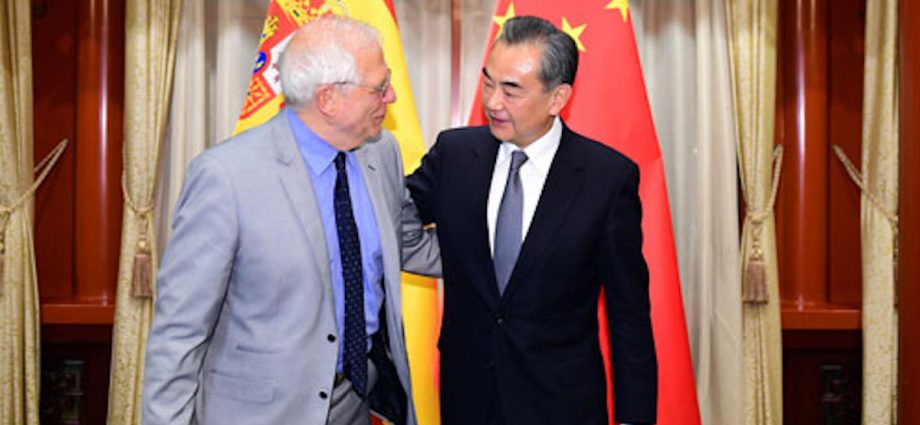Beijing is bidding to highlight its European Union partnership following news that the bloc’s foreign service is preparing to call on member states to diversify their supply chains from China.
Chinese Foreign Minister Wang Yi said on October 17 that the EU should view Sino-EU cooperation objectively, expand common interests and contribute to the stability of global industrial and supply chains.
His comments came after the Financial Times reported that the EU’s foreign service had prepared a paper calling on member states to treat China as an “all-out competitor”, due to the country’s strengthening ties with Russia.
The paper also echoes the Biden administration’s National Security Strategy report, which accuses Russia and China of posing a challenge to international peace and stability.
In that report, published on October 12, President Joe Biden said: “The People’s Republic of China (PRC) harbors the intention and, increasingly, the capacity to reshape the international order in favor of one that tilts the global playing field to its benefit, even as the US remains committed to managing the competition between our countries responsibly.”
Biden said the US will hold Beijing accountable for abuses – alleged genocide and crimes against humanity in Xinjiang, human rights violations in Tibet and the dismantling of Hong Kong’s autonomy and freedoms – even as he said China tries to pressure countries and communities into silence.
“Our strategy will require us to partner with, support and meet the economic and development needs of partner countries – not for the sake of competition but for their own sake,” Biden said.

The National Security Strategy report also said the US would deepen its cooperation with democracies and other “like-minded” states, including those in the Quad (Australia, India, Japan, US), the US-EU Trade and Technology Council, the AUKUS (Australia, United Kingdom, US) and the I2-U2 (India, Israel, UAE, US).
On October 17, the FT reported that the EU’s foreign service had drafted a paper to call on member states to work more closely with the US and other Indo-Pacific powers and diversify their supply chains away from China.
The paper said the EU had to toughen up its attitude towards China, which had become an even stronger global competitor against the EU, the US and other partners.
An unnamed senior EU official was quoted by the FT as saying the forthcoming report would widen the divergence of political choices and positions between China and the EU. The official said China’s backing for Russia in its invasion of Ukraine, its military threats towards Taiwan and its treatment of Hong Kong and Xinjiang warranted a rethink of the EU’s existing policy.
That did not go over well in Beijing.
“China and the EU are partners, not rivals,” said Wang Wenbin, a spokesperson of the Chinese Foreign Ministry. “Our economies are closely linked and highly complementary. Our cooperation far outweighs competition.”
Citing a recent comment made by EU High Representative for Foreign Affairs and Security Policy Josep Borrell, Wang said: “Chinese goods have done much better and much more to contain inflation than all the central banks together.”
He added that arbitrarily placing curbs for political purposes disrupts international cooperation and destabilizes the global supply chains – which he said are the result of the combined force of the market and the choices of businesses.
Borrell had said during the EU Ambassadors Annual Conference on October 10 that the EU’s prosperity in the past had been based on Russia’s cheap energy and China’s big market and cheap goods – but the situation would have to be changed.
“People are not aware of that,” Borell said, but the fact that Russia and China no longer occupy the preeminent positions regarding EU economic development “will require a strong restructuring of our economy.”
He added: “Access to China is becoming more and more difficult. The adjustment will be tough, and this will create political problems.”

Since early 2020, the US has stopped the Netherlands from exporting to China its extreme ultraviolet (EUV) lithography equipment used in making high-end chips smaller than 22 nanometers.
In July this year, media reports said the US pressured ASML Holding NV to stop selling its DUV immersion lithography tools to China. If it succeeds, China will not be able to produce most commonly-used semiconductors.
On October 7, the US Commerce Department’s Bureau of Industry and Security (BIS) unveiled a set of new curbs that forbid sales by US companies of high-end chips and chip-making equipment to China. It said US citizens could not work for certain chips fabs in China.
Zhang Bin, a Jiangxi-based political commentator, wrote in an article on October 17 that the US was persuading the EU to jointly sanction China but it would not succeed.
Zhang acknowledged that China will face a severe situation, as the US has shown its determination to decouple its supply chains. He said China will suffer more than Russia due to the new US sanctions, as the Russian economy is based on food and energy production while China’s is built upon industrial capability.
However, he added that, while the US and its European allies share the same political ideology, they receive different economic benefits from China. He said China can form closer ties with European countries as a way to counteract the US sanctions, which in the current geopolitical climate may or may not be the case.
Read: China-based US chip experts face stay-go dilemma
Follow Jeff Pao on Twitter at @jeffpao3

